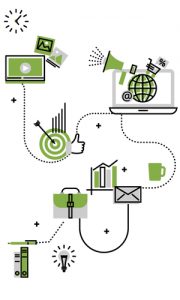What’s digital marketing and why is it essential to the success of any business? Well, digital marketing is a widely used term to encompass all kind of activity which takes place using an electronic devise to promote a brand.
The main difference between digital marketing and traditional marketing is that digital marketing campaigns are executed exclusively through digital channels – typically several of them at once. This gives marketers more real-time control, with more robust analytics tools pumping out data that helps to measure the effectiveness of a campaign.
Digital marketing is defined in the book Digital Marketing: Strategy, Implementation and Practice as simply:
“Achieving marketing objectives through applying digital technologies and media.”
Digital Marketing Explained
Many businesses, particularly those driven by more traditional marketers or business owners, refer to ‘digital’ when discussing ‘our website’ or ‘our Facebook page’. However, this sort of thinking limits scope and opportunity for promotion via numerous other digital techniques. It also means that many activities that should be managed may be missed.
“Digital marketing is defined by the use of numerous digital tactics and channels to connect with customers where they spend much of their time: online. From the website itself to a business’s online branding assets — digital advertising, email marketing, online brochures, and beyond — there’s a spectrum of tactics that fall under the umbrella of “digital marketing.” Hubspot.
Thanks to the introduction of smart phones; there has been an explosion in digital marketing compared to just a few years ago, when much activity done was carried out through laptops and stand-alone computers. So, if you type the phrase “digital marketing” in Google trends, you will see that there is a clear upshift in search terms related to digital marketing over recent years.
The Different Digital Marketing Channels
Any company wanting to reach out to an audience and sell a product or service nowadays, needs to have a digital presence that spans numerous channels and incorporates many different techniques.
“Digital marketing is any form of marketing products or services that involves electronic devices.” Neil Patel
Digital marketing can be split into both “online” and “offline” techniques using digital devises. The main difference between the two is that online marketing channels are based solely on the Internet while offline marketing channels have to do with digital devices which are not necessarily connected to the Internet. In offline marketing, techniques could include electronic billboards, digital product demos, radio, TV and phone (e.g. text messages). These are areas often missed from the digital marketing mix and seen by many as more ‘traditional’ techniques. However, they can complement online techniques well.
When considering online digital marketing, there are 7 broad categories to consider, which are:
- Search engine optimisation (SEO)
- Search engine marketing (SEM)
- Content marketing
- Social Media marketing (SMM)
- Pay-per-click advertising (PPC)
- Affiliate marketing
- Email marketing
Online digital marketing includes managing the many different forms of a company’s web presence, such as company websites, mobile apps, and social media accounts. This works in close cohesion with online promotional communications that drive visitors to a website or social profile, including search engine marketing, online advertising, e-mail marketing and affiliate advertising.
What’s Digital Marketing vs Inbound Marketing?
You may also have heard the term “inbound marketing”, and on the surface, the two seem similar. Both occur primarily online, and both focus on creating digital content for people to consume. So, what’s the difference?
The term “digital marketing” doesn’t differentiate between push and pull (inbound and outbound) marketing tactics. Digital outbound tactics aim to put a marketing message directly in front of as many people as possible (e.g., banner ads you see at the top of many websites). On the other hand, digital inbound tactics use online content to attract target customers onto a website by providing assets that are helpful to them. One of the simplest yet most powerful inbound digital marketing assets is a blog (like this one!), which allows your website to capitalise on the terms which your ideal customers are searching for.
Ultimately, inbound marketing is a methodology that uses digital marketing assets to attract, engage, and delight customers online. Digital marketing, on the other hand, is an umbrella term to describe online marketing tactics of any kind, regardless of whether they’re considered inbound or outbound.
Defining Your Digital Marketing Strategy
A digital marketing strategy is a plan that details how you intend to utilise relevant digital channels to achieve your business goals.
When you design a digital marketing strategy you need to consider which channels to use (driven by whether your audience is already comfortable with that medium), the resources (people, time and money) to assign to each channel and what to expect in terms of results. The best campaigns support the overarching goals of the company. Marketers can enhance any campaign through both free and paid channels but should only do so once return on investment measures are in place.
A common mistake made by many small business owners is that they try to execute everything at once and at the end of the day they see poor results. This is usually because they don’t have the necessary expertise to run digital marketing campaigns, they don’t have time needed to do it justice, they exhaust their budgets on channels that are not suitable for their business or a combination of all three!
Therefore, we always recommend that you follow a step-by-step approach, starting with your website, SEO and content marketing. Once you have these in place for several months, you will gradually experience an increase in traffic and leads/sales and then you can add the other tools to the mix.
Measuring the Success of Digital Channels
A positive return on investment is the goal of every digital campaign. However, while the endgame is of course to increase profits, not every campaign will directly lead to cash in the bank. Some campaigns raise awareness of your brand, while others might generate social media ‘likes’— both of which will help increase profits in the long run, but short-term results can’t be quantified with monetary values.
Just 39% of companies think that their marketing efforts are effective, so getting ROI clear from the outset is essential.
Unlike most traditional marketing efforts, digital marketing allows marketers to see accurate results in real time. With digital marketing, you can measure the ROI of pretty much any aspect of your marketing efforts, including things like:
- What is being viewed
- How often
- For how long
- What generates sales conversions or lead generation
- What content works and what doesn’t work
To gather a full understanding of how to measure digital marketing effectiveness, check out this article by brafton.com.
In Summary
Be sure not to simply consider the likes of social media marketing as the full extent of your digital marketing efforts. This is just one of the many components of digital marketing, as is internet marketing. Single mediums are often confused with digital marketing as a whole, but to fully experience the benefits of a carefully-considered digital marketing strategy, you need to add more digital channels to your repertoire.
Effective digital marketing is essential to the success of any business, but this should not be to the exclusion of all else. It’s not enough to just know your customers; you must know them better than anybody else so you can communicate with them where, when and how they are most receptive to your message. To do that, you need a consolidated view of customer preferences and expectations across all channels, be that online or offline, digital or traditional.
 Joanna Tracey
Joanna Tracey